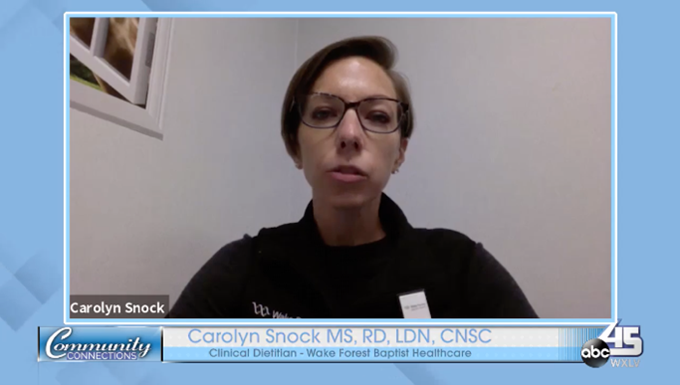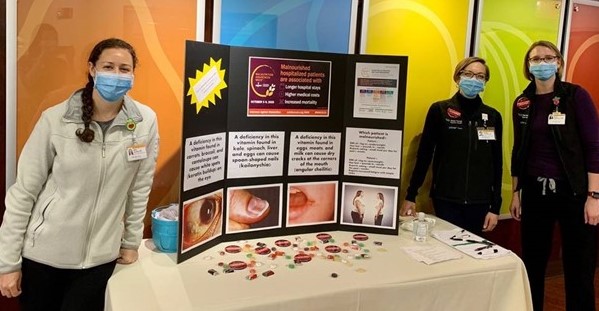 Carolyn Snock, Clinical Dietitian at Wake Forest Baptist University Medical Center, is efficient, energetic, and enthusiastic. And she applied all of those attributes in her multipronged approach to promoting Malnutrition Awareness WeekTM(MAW).
Carolyn Snock, Clinical Dietitian at Wake Forest Baptist University Medical Center, is efficient, energetic, and enthusiastic. And she applied all of those attributes in her multipronged approach to promoting Malnutrition Awareness WeekTM(MAW).
First, to exponentially connect with as many people as possible, Carolyn recruited a Malnutrition Awareness team from the Medical Center’s dietitian group. The dietitians volunteered to not only man an information booth in the hospital cafeteria but to also educate their own teams working throughout the 885-bed hospital.
The team wore MAW buttons and hung posters from the ASPEN promotional toolkit in the staff elevators to spark conversations about the costs and dangers of undiagnosed malnutrition. During lunch hours, they handed out information and even served as quiz masters, offering $25 Starbucks gift cards to any colleague who would try to match photos of the signs of three micronutrient deficiencies—Bitot’s spots, spoon-shaped nails, and angular cheilitis—with their causes.
The contest not only helped attract more than 130 visitors to the booth but also paid off in some unexpected ways. “Anyone who entered could win a gift card whether they answered correctly or not, but everyone really took the time to think about their answers,” said Carolyn. “It was fun watching people work together to answer the questions, too. The booth was an enjoyable bonding experience for our department as well as a way to demonstrate the scope of what RDs can do.”
 Since COVID restrictions limited the number of visitors to the hospital, Carolyn looked for help in reaching the general public. On her neighborhood Facebook page, she asked if anyone had local news or radio connections and was soon interviewed by a local TV news station on the importance of malnutrition awareness. She highlighted the fact that “…our healthcare systems and wellness resources/education often focus on diseases of overconsumption, but under nutrition has a huge impact on medical costs too.
Since COVID restrictions limited the number of visitors to the hospital, Carolyn looked for help in reaching the general public. On her neighborhood Facebook page, she asked if anyone had local news or radio connections and was soon interviewed by a local TV news station on the importance of malnutrition awareness. She highlighted the fact that “…our healthcare systems and wellness resources/education often focus on diseases of overconsumption, but under nutrition has a huge impact on medical costs too.
“More people were interested in malnutrition than I had thought,” observed Carolyn. “We live in an area that sees much more obesity than it does malnutrition—not that the two are mutually exclusive—and I don’t think physicians recognize how much malnutrition is present in our hospital systems. All of the Malnutrition Awareness Week tools that ASPEN gave us, especially the infographic posters showing the costs of malnutrition in dollar-based numbers, were a great way to get physician and staff attention.”
Read more ambassador stories.